At its Hastings premiere, producer Miranda Pinch explained her reasons for making the independent film documentary 'From Balfour to Banksy - Visions and Divisions in Palestine'
A screening of the film 'From Balfour to Banksy - Visions and Division in Palestine' on Thursday evening sparked a lively debate on how ordinary people can help bring about change to the current situation in Israel-Palestine.
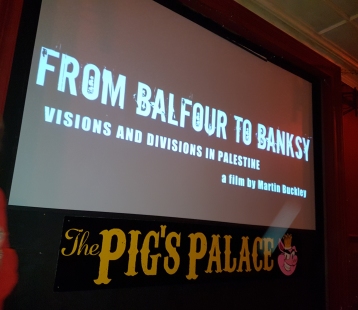 The independent British film, screened at The Pig's Palace and directed by former BBC producer Martin Buckley, set out to examine Britain's role in the creation of the Israeli state through Lord Balfour's famous Balfour Declaration of 1917, and the legacy of his promise to protect the civil and religious rights of the existing non-Jewish communities in Palestine.
The independent British film, screened at The Pig's Palace and directed by former BBC producer Martin Buckley, set out to examine Britain's role in the creation of the Israeli state through Lord Balfour's famous Balfour Declaration of 1917, and the legacy of his promise to protect the civil and religious rights of the existing non-Jewish communities in Palestine.
The film depicts everyday life for Palestinians today and describes how many view that promise as a betrayal since the majority are living under military occupation without civil rights or freedoms, a situation that has gone on for over 50 years.
It also gives voice to different communities within both Israel and Palestine, and tackles vital issues like the settlements, the Separation Wall, child arrests, settler violence, home demolitions as well as how the international community has failed to deal with Israel's continual flouting of international law.
Afterwards, during a Q&A session the film's producer Miranda Pinch explained that her main aim for making the film was to 'get the truth out there.'
'The problem is that the other side is very good at repeating mantras that are lies so often that everyone believes them,' she explained. 'It is difficult to get the truth out there and we are greeted with more and more weapons, like the weaponization of antisemitism. That's why we made the film, that's why there is BDS - Boycott, Divestment and Sanctions - and that's why we ask parliamentary questions every week.'
Miranda, who works as a researcher at the House of Lords, writes up to seven questions every week to the government on behalf of Baroness Jenny Tonge, a lifelong supporter of Palestinian human rights. She described the government's responses to their questions on human rights abuses in Palestine as 'fascinating.'
'They say all the right things, that they are 'concerned,' 'seriously concerned,' 'gravely concerned,' she said. 'That they spoke to the Ambassador last week or last month or next week or they've seen this or that report... but at the end of the day they always do nothing at all because, let's face it, trade, particularly at the moment, and security issues and armament sales are far more important. Even the supplementary questions where we say - well you've just told us that what they're doing is illegal or that children are being abused, what are you going to do about? The answer is nothing.'
Miranda, the daughter of a Jewish Holocaust survivor, said she first came up with the concept for the film during a meeting of The Balfour Project but quickly gave up on the idea after discovering it would likely cost between £50,000-£100,000.
But a small donation of £5,000 and a chance meeting with ex-BBC producer Martin Buckley was enough to get the project off the ground.
'Martin found a student, who became our cameraman and editor, and I booked a 10-day shoot in Israel-Palestine and arranged the contacts on under £5,000 for three of us and it went from there,' she said. 'Martin called it 'guerrilla filming' because we did it without any permissions at all because no one would have given us any.'
The team have been pleased with the response to their film but they have also experienced problems in showing it - the first screening at SOAS University of London was disrupted by pro-Israeli demonstrators and police eventually had to be called. Since then Miranda says that fears of false accusations of antisemitism have put off organisations, particularly universities, from screening the film, with Sussex, Warwick and Winchester Universities all opting out.
However, Miranda says that antisemitism smears haven't put her off and that the film will eventually be free and available to all online. It is also being considered as an educational resource.
One screening to a class of Middle Eastern Studies students had a deep and profound impact on a young Jewish Israeli boy who said it left him very conflicted.
'Now to me, that was worth it,' said Miranda. 'You've got to keep fighting to get the truth out there.'
Miranda said it is 'madness' that if you call someone a Zionist today you are immediately denounced as 'Antisemitic.'
She said: 'What about Christian Zionists? The conflation of Zionism and antisemitism has been created and built upon but some information we can all carry in response to that is that it's not Jewish Zionism but Christian Zionism. I don't think that's widely known. And in America the Republican party is bolstered financially through the Christian Zionists and that's why the Christians worship Trump.'
Garth Hewitt, who co-founded the human rights organisation Amos Trust and was amongst the audience members, described Miranda's film as 'very powerful.'
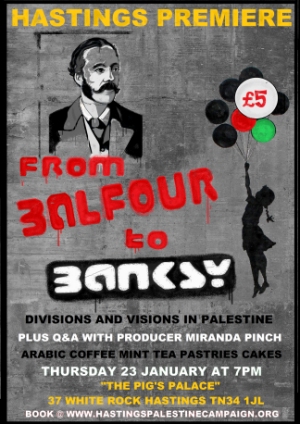 He said: 'I do think there are a lot of people out there who are aware there's something wrong. And the racism against the Palestinians has not been expressed. We need an equality of commitment to raise that issue.'
He said: 'I do think there are a lot of people out there who are aware there's something wrong. And the racism against the Palestinians has not been expressed. We need an equality of commitment to raise that issue.'
Jackie Collins, also in the audience, said: 'It brought home for me the reality of the Wall. Ridiculous in its size, height and the path it takes. What lunacy it is to think an 8 metre high concrete wall is the answer to anything! The point was made, it not only imprisons the Palestinians but also imprisons Israelis.'
Gill Knight, from the Hastings and Rye Palestine Solidarity Campaign which hosted the event, said they were delighted with the turnout and thanked local families for making the Hilbeh cake and baclava pastries that accompanied the mint tea and coffee refreshments during the evening.
'We're very encouraged that so many people are interested in learning more about the historical context to the current situation,' she said. 'I urge everyone to join Palestine Solidarity Campaign, both locally and nationally, as now is a crucial time for the Palestinian people and they need our support more than ever.'
To become a member of the Hastings and Rye PSC please visit our joining page.
The Balfour Project aims to explain and increase public awareness of Britain's current and historical responsibilities in the Middle East: The Balfour Project.
Miranda Pinch highlighted the importance of fighting bias in the media and encouraged the audience to join the fighting fund for Justin Schlosberg's legal challenge to BBC Bias:
Challenge BBC Bias.

 The independent British film, screened at The Pig's Palace and directed by former BBC producer Martin Buckley, set out to examine Britain's role in the creation of the Israeli state through Lord Balfour's famous Balfour Declaration of 1917, and the legacy of his promise to protect the civil and religious rights of the existing non-Jewish communities in Palestine.
The independent British film, screened at The Pig's Palace and directed by former BBC producer Martin Buckley, set out to examine Britain's role in the creation of the Israeli state through Lord Balfour's famous Balfour Declaration of 1917, and the legacy of his promise to protect the civil and religious rights of the existing non-Jewish communities in Palestine.The film depicts everyday life for Palestinians today and describes how many view that promise as a betrayal since the majority are living under military occupation without civil rights or freedoms, a situation that has gone on for over 50 years.
It also gives voice to different communities within both Israel and Palestine, and tackles vital issues like the settlements, the Separation Wall, child arrests, settler violence, home demolitions as well as how the international community has failed to deal with Israel's continual flouting of international law.
Afterwards, during a Q&A session the film's producer Miranda Pinch explained that her main aim for making the film was to 'get the truth out there.'
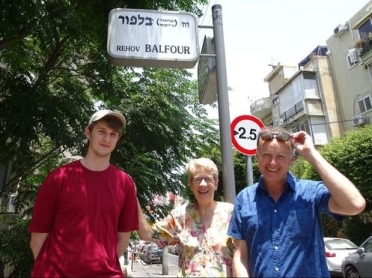 Camera: Alexander Wilks, Producer: Miranda Pinch, Director: Martin Buckley. |
'The problem is that the other side is very good at repeating mantras that are lies so often that everyone believes them,' she explained. 'It is difficult to get the truth out there and we are greeted with more and more weapons, like the weaponization of antisemitism. That's why we made the film, that's why there is BDS - Boycott, Divestment and Sanctions - and that's why we ask parliamentary questions every week.'
Miranda, who works as a researcher at the House of Lords, writes up to seven questions every week to the government on behalf of Baroness Jenny Tonge, a lifelong supporter of Palestinian human rights. She described the government's responses to their questions on human rights abuses in Palestine as 'fascinating.'
'They say all the right things, that they are 'concerned,' 'seriously concerned,' 'gravely concerned,' she said. 'That they spoke to the Ambassador last week or last month or next week or they've seen this or that report... but at the end of the day they always do nothing at all because, let's face it, trade, particularly at the moment, and security issues and armament sales are far more important. Even the supplementary questions where we say - well you've just told us that what they're doing is illegal or that children are being abused, what are you going to do about? The answer is nothing.'
Miranda, the daughter of a Jewish Holocaust survivor, said she first came up with the concept for the film during a meeting of The Balfour Project but quickly gave up on the idea after discovering it would likely cost between £50,000-£100,000.
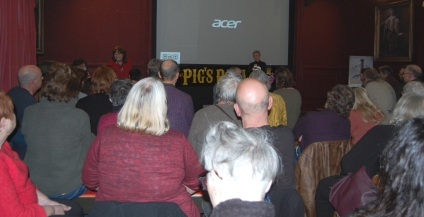 During the Q&A session with film producer Miranda Pinch. |
But a small donation of £5,000 and a chance meeting with ex-BBC producer Martin Buckley was enough to get the project off the ground.
'Martin found a student, who became our cameraman and editor, and I booked a 10-day shoot in Israel-Palestine and arranged the contacts on under £5,000 for three of us and it went from there,' she said. 'Martin called it 'guerrilla filming' because we did it without any permissions at all because no one would have given us any.'
The team have been pleased with the response to their film but they have also experienced problems in showing it - the first screening at SOAS University of London was disrupted by pro-Israeli demonstrators and police eventually had to be called. Since then Miranda says that fears of false accusations of antisemitism have put off organisations, particularly universities, from screening the film, with Sussex, Warwick and Winchester Universities all opting out.
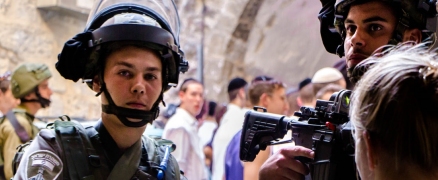 From the film: IDF at Hebron. |
However, Miranda says that antisemitism smears haven't put her off and that the film will eventually be free and available to all online. It is also being considered as an educational resource.
One screening to a class of Middle Eastern Studies students had a deep and profound impact on a young Jewish Israeli boy who said it left him very conflicted.
'Now to me, that was worth it,' said Miranda. 'You've got to keep fighting to get the truth out there.'
Miranda said it is 'madness' that if you call someone a Zionist today you are immediately denounced as 'Antisemitic.'
She said: 'What about Christian Zionists? The conflation of Zionism and antisemitism has been created and built upon but some information we can all carry in response to that is that it's not Jewish Zionism but Christian Zionism. I don't think that's widely known. And in America the Republican party is bolstered financially through the Christian Zionists and that's why the Christians worship Trump.'
Garth Hewitt, who co-founded the human rights organisation Amos Trust and was amongst the audience members, described Miranda's film as 'very powerful.'
 He said: 'I do think there are a lot of people out there who are aware there's something wrong. And the racism against the Palestinians has not been expressed. We need an equality of commitment to raise that issue.'
He said: 'I do think there are a lot of people out there who are aware there's something wrong. And the racism against the Palestinians has not been expressed. We need an equality of commitment to raise that issue.'Jackie Collins, also in the audience, said: 'It brought home for me the reality of the Wall. Ridiculous in its size, height and the path it takes. What lunacy it is to think an 8 metre high concrete wall is the answer to anything! The point was made, it not only imprisons the Palestinians but also imprisons Israelis.'
Gill Knight, from the Hastings and Rye Palestine Solidarity Campaign which hosted the event, said they were delighted with the turnout and thanked local families for making the Hilbeh cake and baclava pastries that accompanied the mint tea and coffee refreshments during the evening.
'We're very encouraged that so many people are interested in learning more about the historical context to the current situation,' she said. 'I urge everyone to join Palestine Solidarity Campaign, both locally and nationally, as now is a crucial time for the Palestinian people and they need our support more than ever.'
Challenge BBC Bias.
